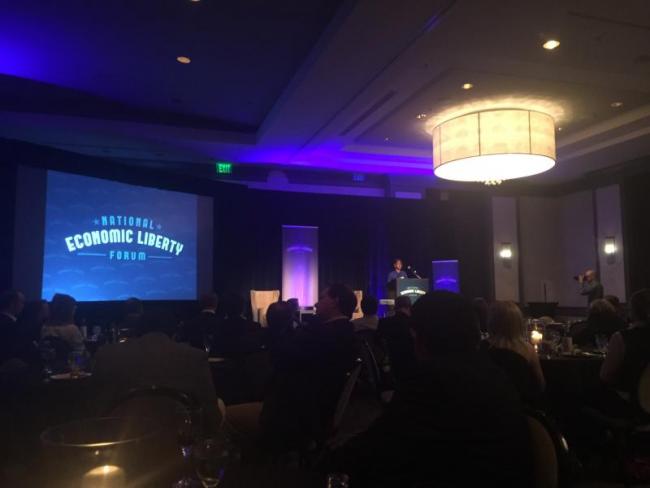License to Kill (Opportunity)

When unions and government collude, workers and consumers lose
I met Melony Armstrong at the Institute for Justice (IJ) National Economic Liberty Forum welcome dinner on April 27, 2016. Over a plate of chimichurri steak and roasted potatoes, I had no idea that within the next 24 hours, I would hear her inspirational story.
Melony decided to pursue her own business in the natural hair-braiding industry after graduating college with a degree in psychology. She even invested in a specialized class nearly 300 miles away from her home in Mississippi.
But her knowledge and entrepreneurial spirit weren’t enough for Mississippi’s occupational licensing office. According to the state’s extensive laws, Melony had to enroll in a 300-hour “wigology” course. As if the added hours weren’t bad enough, “wigology” classes do not even cover natural hair-braiding.
Finally finished with the course, Melony was able to open her company, but more rules and regulations were not far behind. She wanted to expand her business and become a braiding instructor. The requirements for Melony’s teaching license? An additional 3,200 hours.
These absurd barriers to market entry are known as “occupational licensing.” Occupational licensing can ensure health and safety standards for some consumers, but far too often, government regulation does more harm than good.
At the IJ conference’s lunchtime keynote speech, Maureen Ohlhausen, a Commissioner at the Federal Trade Commission, called occupational licensing a “state-sponsored, government-enforced prohibition on competition.”
The taxi medallion system imposes ridiculously expensive government-controlled permits that confine drivers. John Stossel, a libertarian expert, declares that because of the system, only big companies can afford medallions and “these drivers are not entrepreneurs, they’re employees.” Similarly, occupational licensing affects the economy, hopeful workers and the customers they serve.
Melony’s entry into the world of business was ridden with obstacles; each time she advanced, a new government obstacle that made no sense would pop up. Restricting employment opportunities and preventing potential companies from contributing to the economy may be unfair, but it happens everyday.
According to a 2011 report by the National Center for Policy Analysis, in the 1950’s, only 5 percent of jobs required a license. By 2006, that number rose to 29 percent. At the Dallas IJ conference, University of Minnesota professor, Morris Kleiner, claimed that this increase in licensing means higher costs with far less productivity. Additional consequences of unfair licensing, in Kleiner’s view, are limited inter-state mobility and increased rates of dead weight loss.

Pictured above: panel featuring Professor Morris Kleiner and IJ Director of Strategic Research, Dick Carpenter.
Melony dreamed of becoming an entrepreneur. She wasn’t looking to become the next Bill Gates, but rather provide for herself and her family by doing what she loved. But Melony’s dream became a nightmare.
In August 2004, Melony teamed up with the Institute for Justice to fight the unfair occupational licensing in U.S. District Court. In response to the lawsuit, Mississippi lawmakers not only changed entry requirements to a small $25 fee, but also excused braiders from the excessive training.
Occupational licensing can protect workers and consumers. But sometimes government goes above and beyond safety, all in the name of making money. And controlling who does what is not a power of the people, by the people and for the people.
That is simply un-American.
To learn more about Melony’s story and IJ’s fight for braiding freedom, click here.





